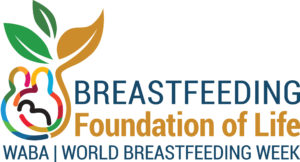
We are celebrating World Breastfeeding Week from August 1-7, 2018. This celebration is to raise awareness of the benefits of breastfeeding. It is also to advocate for support of all mothers and their children in breastfeeding.
This annual celebration began in 1992 and is observed in over 120 countries. It is coordinated by the World Alliance for Breastfeeding Action. Many other organizations partner with them. Some of these include the World Health Organization, UNICEF and La Leche League International. This week also commemorates the “Innocenti Declaration” on the protection, promotion and support of breastfeeding.
Why is breastfeeding so important that there are declarations written about it?
It is well known that breastfeeding provides good nutrition to infants, but there is so much more to it. Here are a few of the amazing physical benefits of breastfeeding:
- Improving breastfeeding rates could save the lives of an estimated 820,000 children under the age of 5 every year. The majority (87%) are under 6 months of age.
- Breastfeeding also protects mothers. Breastfeeding can protect against postpartum hemorrhage, postpartum depression, ovarian and breast cancer, heart disease and Type 2 diabetes.
- About 20,000 maternal deaths from breast cancer could be prevented if breastfeeding were nearly universal.
These numbers are quite startling. Yet they only touch on physical benefits of breastfeeding. You may think these things are only important in less developed countries. Maybe these benefits of breastfeeding don’t really apply to you.

But did you know that research indicates that breastfeeding does so much more? For example, breastfeeding also promotes neurological, social, and psychological development. A study at Brown University indicated that breastfeeding improves brain development in infants. Using MRI, they saw more growth in areas of the brain associated with cognition, language, and emotional function in children who were breastfed.
Breastmilk changes to meet your baby’s needs. It has remarkable immune-boosting components and can even help your baby sleep.
- Breastmilk changes as your baby grows.
- It changes during growth spurts and illnesses.
- If the mother is exposed to a virus, she will produce antibodies that get passed on to the baby to protect him/her.
- Breastmilk changes during a single feeding. It does this to provide a balance of fat and other nutrients.
- It even changes from day to night to help baby sleep.
There is no substitute for the amazing adaptability of breastmilk!
There are advantages for baby and mother to breastfeeding. Some benefits last well beyond infancy. Here are a couple quick lists of how breastfeeding is good for baby and for you.
Benefits of breastfeeding for baby:
- Breastmilk provides the ideal nutrition for infants. It is more easily digested than infant formula.
- Breastmilk helps your baby fight off viruses and bacteria.
- Breastfeeding lowers your babys’ risk of having asthma or allergies.
- Babies who are exclusively breastfed have fewer ear infections, colds and bouts of diarrhea. They also have fewer trips to the doctor.
- Breastfeeding has been linked to higher IQ scores in later childhood.
- The AAP says it plays a role in the prevention of SIDS.
Benefits of breastfeeding for the mother:
- Breastfeeding burns extra calories so it can help you lose pregnancy weight faster.
- It lowers your risk of breast and ovarian cancer and may lower your risk of osteoporosis.
- It saves you time and money since you don’t have to buy and prepare formula and bottles.
- Breastfeeding moms miss less work time because their infants are healthier.

You may recognize the amazing benefits of breastfeeding. But the decision to breastfeed can be daunting. If your mother or sisters did not breastfeed, you may not have built in support for breastfeeding. If your friends or family aren’t encouraging toward this choice, it can be hard. It may be easy to switch to formula when things get difficult. If you’ll be working, you may wonder how you can succeed at breastfeeding with this added challenge. (See tips for breastfeeding while working.)
There is a big demand for support for moms who may struggle with breastfeeding. Lack of support when issues arise can be prevalent in the U.S. and other western societies. There can still be a lot of misunderstanding about breastfeeding. Breastfeeding can be an especially difficult decision if you have not seen it modeled or do not feel supported in that choice.
I had challenges trying to breastfeed my children – and had trouble finding support. When I ran into issues with my oldest child, I was told to just give her formula and not bother. I felt rather defeated and gave her formula. With my second child, I was hospitalized for a brief time when he was two months old. Again I was told to give him formula. The option to pump breastmilk was never mentioned to me. Again, I felt defeated. I felt like I had let myself and my child down.
With my third child, I was determined to breastfeed. We started out strong. But we ran into some troublesome issues when she began to cluster feed. I didn’t know what was going on. She started feeding closer and closer together at certain times of the day. This time, I was given some support and we made it over these hurdles. I breastfed her until she weaned herself at 13 months.
Moms may come up against frustrating surprises in their breastfeeding journeys. At these times, support is crucial. If you’re looking for support with breastfeeding in Madison, Wisconsin, there are people who can help you. Please contact me, Dane County Public Health or the local La Leche League chapter.
Breastfeeding your child is a very personal decision for each family. There are many factors that come into play when making such an important choice. Substitutes do not have all the ingredients and properties of breastmilk. But in situations where breastmilk is not an option, formula still provides the means to raise happy children.
However, for mothers who wish to breastfeed, there is help and support available. You can take on this adventure. And you can have the support and knowledge you need to meet your breastfeeding goals.

